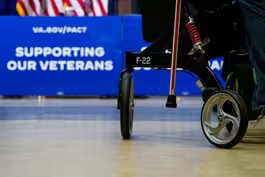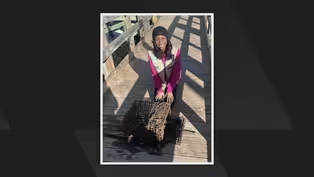
Why little is known about what causes many miscarriages
Clip: 6/23/2024 | 4m 4sVideo has Closed Captions
Why little is known about what causes many pregnancies to end in miscarriage
Every year, about 1 million pregnancies in the U.S. end in a miscarriage. In as many as half those cases, doctors are at a loss to explain why, and experts say stigma and shame are hampering efforts to learn about what causes miscarriages. PBS News Hour’s Courtney Norris reports.
Problems playing video? | Closed Captioning Feedback
Problems playing video? | Closed Captioning Feedback
Major corporate funding for the PBS News Hour is provided by BDO, BNSF, Consumer Cellular, American Cruise Lines, and Raymond James. Funding for the PBS NewsHour Weekend is provided by...

Why little is known about what causes many miscarriages
Clip: 6/23/2024 | 4m 4sVideo has Closed Captions
Every year, about 1 million pregnancies in the U.S. end in a miscarriage. In as many as half those cases, doctors are at a loss to explain why, and experts say stigma and shame are hampering efforts to learn about what causes miscarriages. PBS News Hour’s Courtney Norris reports.
Problems playing video? | Closed Captioning Feedback
How to Watch PBS News Hour
PBS News Hour is available to stream on pbs.org and the free PBS App, available on iPhone, Apple TV, Android TV, Android smartphones, Amazon Fire TV, Amazon Fire Tablet, Roku, Samsung Smart TV, and Vizio.
Providing Support for PBS.org
Learn Moreabout PBS online sponsorshipJOHN YANG: Every year in the United States, about 1 million pregnancies end in a miscarriage, and in as many as half of those cases, doctors are at a loss to explain why they happened.
Experts say stigma and shame are hampering efforts to learn more about what causes miscarriages, NewsHour Deputy Senior Producer Courtney Norris looked into this for a very personal reason.
COURTNEY NORRIS: As many as one in four pregnancies in America will ended a miscarriage but we still know little about why I experienced this firsthand.
When I miscarried earlier this year, doctors couldn't give me a reason.
Experts say research on the issue is lagging.
DR. ZEV WILLIAMS, Columbia University: It is by far the most common complication of pregnancy.
Yet most people think it's very rare.
And a big part of that is there is such a reluctance to even speak about it.
COURTNEY NORRIS (voice-over): I turned to experts like Dr. Zev Williams with Columbia University's Irving Medical Center, and Dr. Diana Bianchi, the director of the National Institute of Child Health and Human Development.
DR. DIANA BIANCHI, National Institute of Child Health and Human Development: What's different about miscarriage is the guilt factor.
You know, why couldn't I continue this pregnancy?
In my former practice, people came up with all kinds of explanations why they lost the pregnancy, and probably none of them were true.
COURTNEY NORRIS: One problem and miscarriage research is the stigma that comes with the loss.
Dr. Asima Ahmad is an OB/GYN who herself miscarried.
DR. ASIMA AHMAD, OG/GYN: All of us end up blaming ourselves.
I did that myself and I am a specialist in this field.
But most of the time, it's not your fault.
It's not something you did.
There are other reasons for pregnancy loss, but the majority are genetic and you will have control over it.
COURTNEY NORRIS: While most miscarriages occur due to chromosomal abnormalities.
Little is known about other potential reasons.
ZEV WILLIAMS: There is still this black box area where pregnancy losses occur.
And we don't know why those are happening.
And that's a big area of investigation.
COURTNEY NORRIS: Part of the problem is the stigma around discussing pregnancy loss despite the fact that it's the most common pregnancy complication.
DIANA BIANCHI: It's not something that people are willing to share.
It's often kept as a family secret.
In many cultures, it is particularly important for a woman to be fertile and any discussion of anything that doesn't result in a live born baby is not encouraged.
COURTNEY NORRIS: Another reason science is behind on miscarriages, she says is how hard it can be to connect with patients when they lose a pregnancy.
DIANA BIANCHI: With a miscarriage, particularly in early miscarriage, it's quite difficult to collect the material to study.
So oftentimes, the first indication that there's a miscarriage is there's bleeding, and one may not recognize that they're actually passing tissue.
COURTNEY NORRIS: Finally, it's difficult to get participants for clinical trials for new treatments.
ZEV WILLIAMS: There is a greater willingness to participate in studies, but a reluctance to be randomized to a placebo group to not receive treatment.
And so that I think is a very real limitation to the interventions that we send to sort of conducting the rent the rigorous randomized control trials that we ideally would like to perform.
COURTNEY NORRIS: While the science catches up.
Dr. Ahmad says there are ways to support people who miscarry from friends checking in to employers giving time off after a pregnancy loss.
ASIMA AHMAD: Even if it's really early on in pregnancy versus like it was a 25 week loss, it can still be hard for that person, so giving them that time to be with their family heal.
COURTNEY NORRIS: And one hopeful thing research does show many women who miscarry go on to have full term pregnancies.
COURTNEY NORRIS (voice-over): For PBS News Weekend, I'm Courtney Norris.
How private firms profit from veterans’ disability claims
Video has Closed Captions
Clip: 6/23/2024 | 7m 6s | What to know about the private firms illegally profiting from veterans’ disability claims (7m 6s)
How to reduce the number of teens aging out of foster care
Video has Closed Captions
Clip: 6/23/2024 | 5m 7s | How Arizona aims to reduce the number of teens aging out of foster care (5m 7s)
Ninth grader helps restore Mississippi’s oyster reefs
Video has Closed Captions
Clip: 6/23/2024 | 4m 17s | Meet the ninth grader who’s helping restore Mississippi’s oyster reefs (4m 17s)
Providing Support for PBS.org
Learn Moreabout PBS online sponsorship
- News and Public Affairs

FRONTLINE is investigative journalism that questions, explains and changes our world.

- News and Public Affairs

Amanpour and Company features conversations with leaders and decision makers.












Support for PBS provided by:
Major corporate funding for the PBS News Hour is provided by BDO, BNSF, Consumer Cellular, American Cruise Lines, and Raymond James. Funding for the PBS NewsHour Weekend is provided by...


